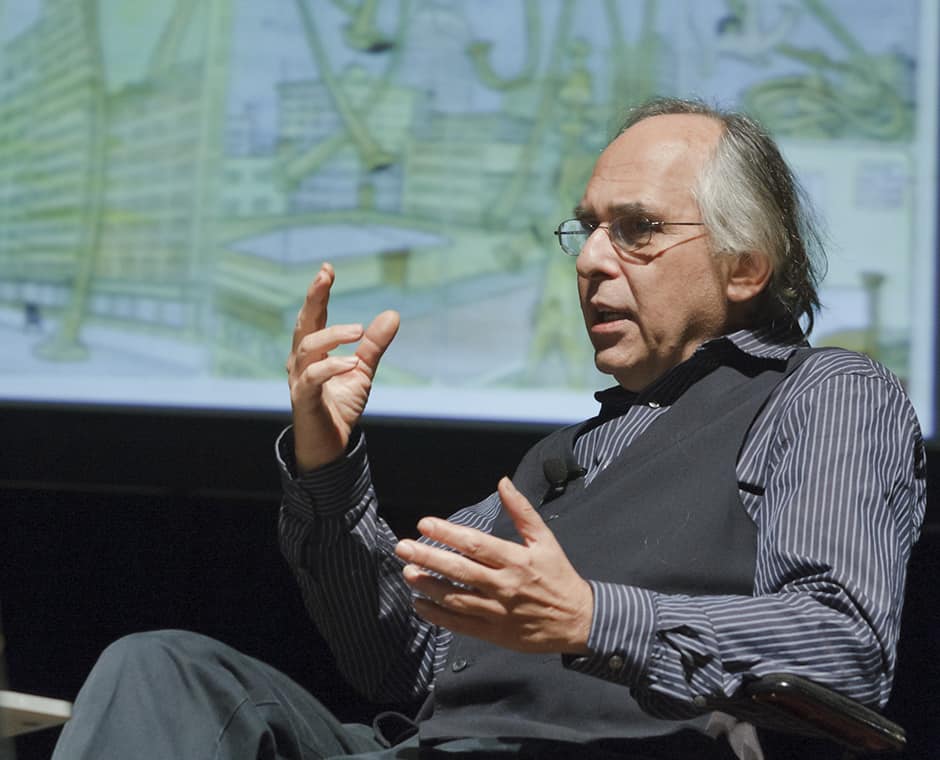“Recently, people have been saying that I’m the father of the graphic novel,” muses Art Spiegelman as he stares blankly out at the crowd filling the seats of the Bloor Cinema. “Well, in that case, I’m demanding a blood test.”
Spiegelman is the Pulitzer prize-winning, idiosyncratic mastermind behind critically acclaimed graphic novels Maus and In The Shadow of No Towers, as well as the creator of decades worth of covers and essays for The New Yorker. When taking into account his work for Raw Magazine and Arcade: The Comic Revue, it’s difficult to overstate the cultural significance of Spiegelman’s immensely influential body of work.
While he modestly denies the title of comics’ paternal figure, the label is nevertheless understandable. His impact on the world of politically driven satire stands above other graphic artists and cartoonists; it is the subject of his appropriately titled lecture last Monday night, What the $@%!: The Spiegelman Influence.
Spiegelman was introduced to MAD Magazine as a young boy. Inspired by the publication’s outlandish humour and satirical take on American politics, he began creating his own cartoons. He credits MAD for launching his career as a cartoonist and gives the magazine equal credit for bestowing upon young people like himself a certain sense of political cynicism that was heavily frowned upon when he was growing up in the 1960s.
Now, Spiegelman has inadvertently found himself a demi-God-like figure for cartoonists in the Western hemisphere. In his graphic novel Maus, he tackles his father’s odyssey as a Jew during the Holocaust; In the Shadow of No Towers addresses his own trauma as a New Yorker following the 9/11 attacks. Having developed a reputation as someone willing to address disaster head-on (he’s frequently been quoted as saying “disaster, it’s my muse!”), it’s unsurprising news that Spiegelman has become the go-to figure to comment on the recent murder of 11 members of the satirical magazine Charlie Hebdo.
Much like his politically driven — and often controversial — work, Spiegelman’s lectures are blatantly candid and lacking in any sort of censorship. He uses freedom of speech to its greatest extent, having focused the majority of his career around it.
“What the $@%! Happened to Comics, is, in my opinion, the best fucking way to describe this talk,” he announces, sounding off the names of each symbol used in the lecture’s title. The different symbols, he explains, are correlated with the concept behind satirist drawings. It allows for the viewer to derive meaning out of an image — placing words in your head without explicitly saying them.
“A cartoonist’s goal is to create an image that, once you’ve seen it, you won’t be able to ‘un-see’,” he says, while standing highlighted against a drawing of a member of Al-Qaeda preparing to duel an American bureaucrat. Between the two figures sits Spiegelman, unconscious, with a caption that reads, “Equally terrorized by Al-Qaeda and by his own government.”
“This is when most people assumed that I had fallen off my rocker,” he explains.
Spiegelman began the presentation calm and collected, but was quickly derailed by an impassioned rant on censorship in the modern media.
The New York Times’ reluctance to publish the Charlie Hebdo drawings that initially prompted the attacks greatly upset him. According to Spiegelman, The Times told readers to search for the drawings online if they wanted to see them.
“You don’t send people to the internet,” he says, adding, “Because then why should they come back to you?”
With that, the lecture quickly turned to the moral implications of the Hebdo controversy.
“I’ll never understand how [Charlie Hebdo] could forgive those guys,” sighs Spiegelman, referencing the magazine’s recent issue whose cover reads, “tout est pardonné,” meaning “all is forgiven.”
For Spiegelman, the attack was not only a massacre of innocent civilians, but an attack on the ability to enact free speech. He notes that, while many of the cartoons made by Hebdo could have been interpreted as racist, the magazine often discussed disfranchised minority groups within France and how their living conditions could be improved. In Spiegelman’s view, the extremists were missing the point.
He then, true to his eccentric public persona, abruptly left the stage to use the bathroom, mic left on until a helpful audience member hollered at him to turn it off.
Returning to the stage for a question period, Spiegelman received numerous inquiries regarding his opinion on free speech. Taking into account his own experiences, he truly understands the sensitivity needed in the characterization of other religions, even if the intentions are in good taste.
“I’ll never understand the big deal over depicting Mohammed,” he sighs, and pauses before adding, “But then again, the satirist depictions directed towards Jews has never been my cup of tea, either.”


